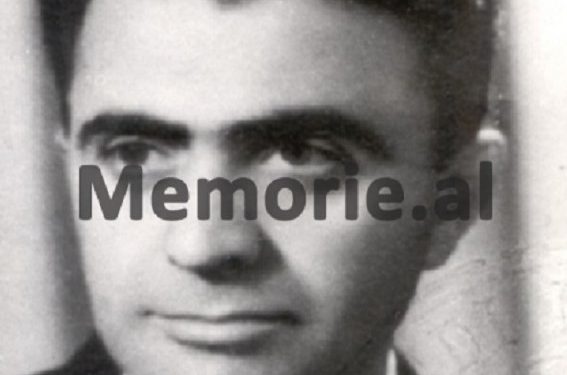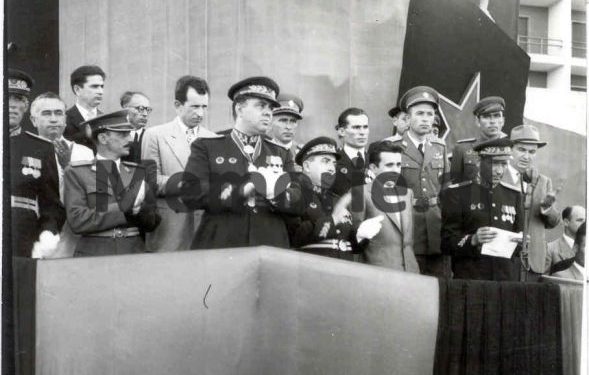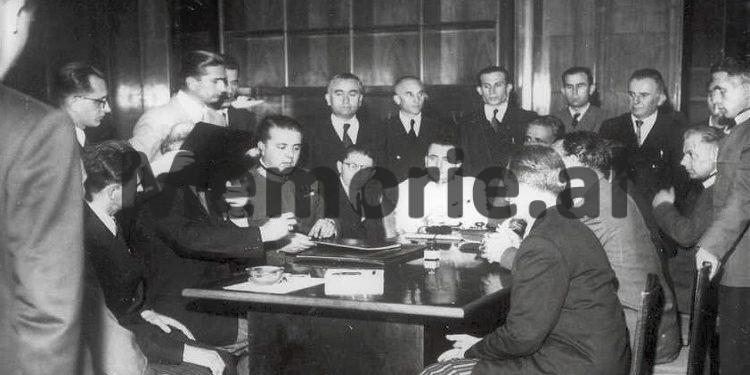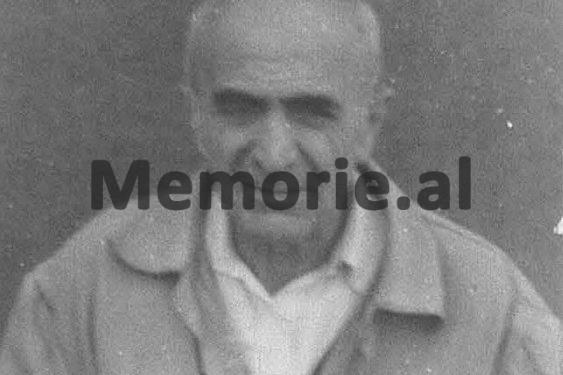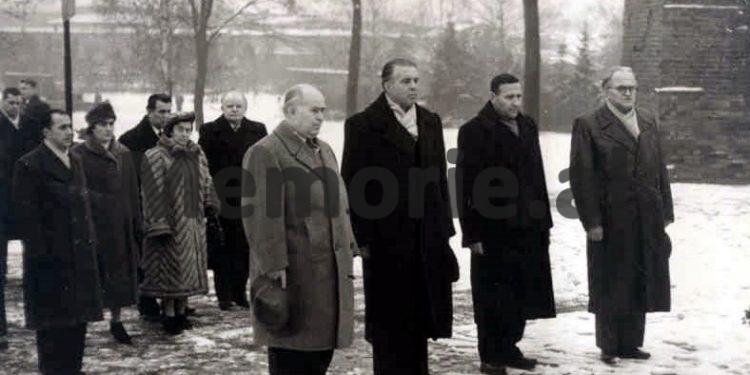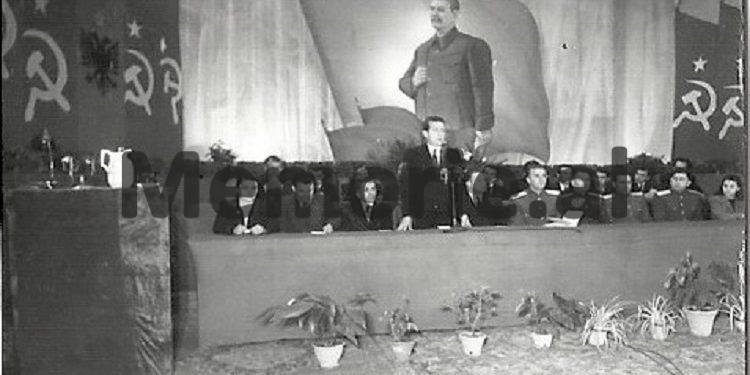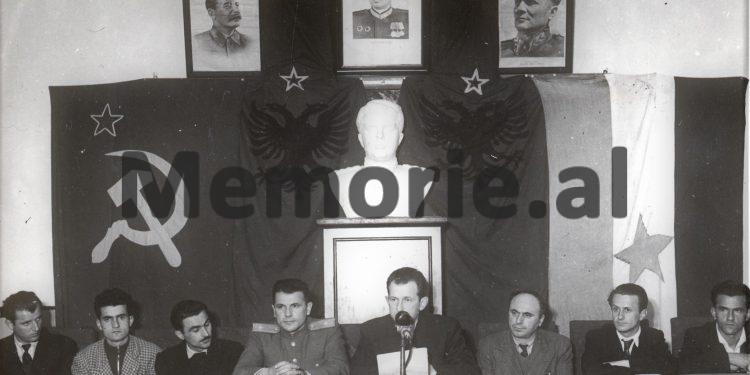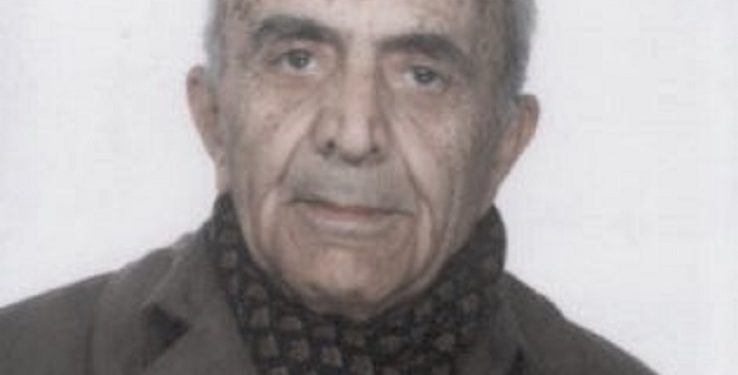Dashnor Kaloçi
Part twenty
Memorie.al/ publishes a voluminous archival file issued by the institution of the Authority for Information of Former State Security Files, where there are hundreds of documents with the logo “Top secret” belonging to the former political prisoner, Xhavit Qesja, with originally from the city of Kruja, whose family during the period of occupation of the country, 1939-1944, was closely associated with the Anti-Fascist Movement, being one of its main bases and made available all the wealth it had, as Xhavit was an among the first members of the Albanian Communist Party for the Kruja district, leading the Kruja-Ishëm partisan battalion and the 22nd Assault Brigade. Xhavit Qese’s political career after the end of the War, where he was appointed and served in senior positions in the Albanian Army, the apparatus of the Central Committee of the ALP, and several districts of the country, from where he was sent to study in the Soviet Union, where stayed until 1957, when he was announced to return to Albania urgently, after openly expressing his views in favor of the political line being pursued by the main Kremlin leader, Nikita Khrushchev, condemning the Stalin cult. Enver Hoxha’s conversation with Xhavit Qesen in his office in the Central Committee, where he sharply criticized him for the wrong views he had expressed during his studies in Moscow, urging him to reflect and make self-criticism, but Xhavit rejected the suggestion of the first secretary of the Albanian Labor Party, which caused him to no longer be allowed to go to the Soviet Union to complete his studies, but to be sent to work as deputy chairman of the Elbasan Executive Committee, from where a year later, he was expelled from the Party and exiled to Zvërnec Island, where the communist regime kept isolated some of the former senior party and state cadres whom he had condemned for their anti-party views. Xhavit Qesva’s long ordeal and persecution from 1957 to 1990, where he spent a full 32 years in prison and internment, being one of the few convicts in Burrell Prison who went on long hunger strikes in protest of the treatment and savage attitude that the communist regime of Enver Hoxha was holding towards him. The complete form, investigative and judicial file in charge of Xhavit Qeses, which is published for the first time by Memorie.al, which contains the documents of the former State Security that reflect the prosecution and wiretapping against him, the reports of Security collaborators with pseudonyms their correspondence with the letters he sent to the highest party and state instances, as well as the highest leaders of the ALP, until 1991 when he was released from prison!
Continued from the previous issue
Report-information of the senior State Security officer, Colonel Filat Muço, with the data of the Security collaborator with the nickname “Shkumbini” regarding the interceptions of the internees in the Zvërneci camp
Taken from Colonel Filat Muço
Given by B.p. “Shkumbini”
Dt. 11.3.1961
R E P O R T
On February 4, 1961, when the family of Iljaz Ahmeti and Spiro Gjoka came, a small evening was organized and during the evening Xhavit Qesja, Peço Kagjini and Foni Qirko drank. At this time Xhaviti told me: When Tuk Jakova came to Berat, I was the secretary of the Party Committee and since I could not speak, I limited myself to just a greeting with a smile. “Let this remain between us.”
At this time Peço Kagjini approached me and kissing me, said to Xhavit: “This is blood like us”.
The IV Congress was attended with great interest by Foni, Tahiri, Xhaviti, Peçua and Pëllumbi. The readings and discussions of the foreign delegates were done collectively. One thing has been noticed in the discussions of the delegates of the People’s Democracies, they have been read with great interest, as p. sh. that of Czechoslovakia, Poland and the Soviet Union.
While reading the discussions of the Chinese delegate and especially the Vietnamese one, not only were they not listened to attentively, but on the contrary there was ironic laughter, as from Peço, Tahiri and Xhaviti.
In a conversation that Tahiri had with me on the issue of not allowing his wife to come here, he told me that now it was seen clearly and by the Congress that these of ours have broken with the Soviet Union.
Foni told me during a conversation that opened around Congress, which it now seems clear that two currents have been created in our Camp and let’s see how the work will proceed and which one will win!
My attitude has always been listening to the unit.
“Shkumbini”
Report of the State Security Directorate at the Ministry of Internal Affairs, on the pursuit and surveillance of Pëllumb Dishnica, as an anti-party element, since 1955
PEOPLE’S REPUBLIC OF ALBANIA “Top Secret”
MINISTRY OF INTERNAL AFFAIRS Tirana, on 23.10.1961
DIRECTORATE OF STATE INSURANCE
Nr. 05
R E L A T I O N
ON PIGEON DATA DISNICA AND XHAVIT BAG
Pëllumb Jaup Dishnica, put into active processing on 19.1.1955, as an anti-party element, hit by the XI Plenum of the Central Committee of the ALP for hostile activity in favor of the Yugoslav Intelligence in the time of Koci Xoxa.
The aforementioned was reactivated against the party and its leadership during the Tirana Conference in April 1956.
From the time of its elaboration until before the Tirana Conference, Pëllumb Dishnica has been very reserved, being satisfied only with rare associations with some hit elements and with any expression of dissatisfaction against the line of our Party.
Successive events in the international arena and within our country, during the years 1954-1955, make Pëllumb Dishnica active against our Party.
In the beginning he gets in touch and demonstratively associates with people hit by the Party, such as: Dali Ndrenë, Abedin Shehun, Myzafer Spahon, etc., and later he is closely associated with many anti-party elements of the Tirana Conference, such as eg with: Taho Sejkon, Agron Frashëri, Pajo Islami, Qamil Dishën etc.
At the meeting of the basic organization of the Ministry of Industry, to give orders to the delegates of the Conference, in April 1956, he gave provocative and hostile messages, demanding that the Conference look at the question of the economic condition of the people and the cult of the individual.
After the Tirana Conference, it was revealed that Pëllumb Dishnica was one of the main initiators for organizing hostile work in this conference, for which he was expelled from the Party and in November 1956, he was interned for five years in the district of Fier and in in 1958 he was transferred to the Zvërnec Camp, where he continues to be today.
Being in the city of Fier as an internee, from the very beginning Pellumbi came in contact and established close hostile ties with the anti-party element Peço Fidhi. Both of them, in each other’s houses and in the presence of their wives, have made hostile comments, taking into consideration the whole line and activity of our Party and have considered it unfair in every direction, such as. in foreign policy, in economic affairs, in personnel policy, in the internal democracy of the Party, etc.
The events of 1956 in Hungary have been described as a revolution, saying that this was imposed on the Hungarian people by the lack of democratic freedoms and by the politics of the party as a whole, led by Rakoshi. They have said that the mistakes that Rakoshi made in Hungary were made by our leadership here and perhaps on a larger scale.
The changes in Poland and the arrival of Gomulka in power have been welcomed with pleasure, considering these as manifestations of the people’s dissatisfaction with the existing shortcomings and that there are such mistakes in our country as well.
They expressed their full approval of the policies and views of the Yugoslav revisionists, to whom they wept, saying that “much speculation is being made at their expense.”
Speaking about the internal democracy of our Party, Pellumbi said: “Some of the old comrades of the Party expelled them, some of them were interned and some of them disappeared. The big one within a few years “fixed” the party, it has terrified them: if he had acted differently, he would not have stayed where he is. There has never been such a control system in any feedback; this is an unprecedented police regime, the regime of the hurricane and the rope. “History does not recognize such a bureaucratic state.”
And below Pellumbi continues: “After the Tirana conference, all those good people were arrested. Terrible corruption! Humiliation, hypocrisy, servility, all here. They compare everything to the time of Zog, but even then, compared to today, we were flowers. They have no friends for murder, for whores and for anything else. How shameless they are ”!
Commenting on the desire to overthrow the leadership of our State Party. Pëllumb Dishnica said: “The problems that arose after Stalin’s death will be brought to the fore again, and then our leaders will once again find themselves in difficult positions.
But they do not play, it is impossible for them to make these concessions because they are afraid. These do not let anyone speak. A man asks a question, at once they say: who will teach him, therefore they will get out of the situation again. The thing is that if no forces were found here inside, it is a bit difficult to fall. “Let these be peeled once, without letting anyone come after them”.
From the joint activity that Pëllumb Dishnica had with Peço Fidhi in Fier, it results that both of them ended up as regular agents of the Yugoslav Intelligence. In this regard, in a conversation with one of our sources, Peço Fidhi said: instructions, we would come out as an espionage group and in the first place Pëllumb Dishnica would be beheaded, because he has been in opposition to the Party several times “.
While Pellumbi is being interned in the Zvërnec Camp, he continues to be very hostile. Together with Xhavit Qesen, he did not leave the party problem without discussing and without giving a pronounced hostile character to their conversations. They are openly determined to change the situation in our country, managing to say that it is more favorable for them to establish an anti-popular regime here; it is enough to overthrow our leadership.
Prisoner Taho Sejko testifies how together with Pajo Islami and Pëllumb Dishnica, on the threshold of the Tirana Conference, they talked about issues that should be raised at the Conference, such as the economic treatment of the leaders, the attack on Tuk Jakova and Bedri Spahiu, the respect for socialist legitimacy, the issue of criticism and self-criticism in the party, relations with Yugoslavia, etc. Regarding the improvement of relations with Yugoslavia, Pëllumb Dishnica has expressed the opinion that without considering the case of Koci Xoxa, there is no rapprochement with the Yugoslavs.
Taho Sejko, also testifies that Panajot Plaku told him that in our country there is an opposition against the leadership of the Party and the state, which was hit hard by the expulsion of Tuk Jakova and Bedri Spahiu from the Central Committee and that in this opposition he did Pëllumb Dishnica also participated.
Xhavit Hajdar Qesja, put into active elaboration on 15.11.1957, as an anti-party element, which has resolutely defended and defends the anti-Marxist and revisionist views of the Yugoslav leaders.
Defending the theses of the Yugoslav revisionists, Xhavit is openly opposed to the attitude and policy of our Party towards every issue, not approving the right measures of the Party and moreover considers them as anti-Marxist and that, according to him, anything from our leadership, is done only to defend its positions.
For the Yugoslavs, Xhavit said that they build socialism according to the Paris Commune, guided by the principles of Marxism-Leninism and that this truth about Yugoslavia is recognized by the whole world, only our leadership ignores it for its personal interests, because if do this, then they must recognize their mistakes and lose the posts they have./Memorie.al
The next issue follows




